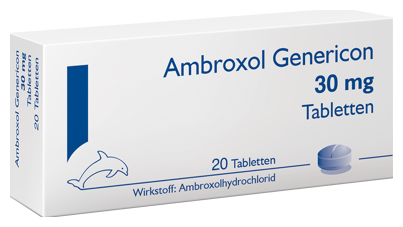Genericon
Genericon Ambroxol 30 mg 20 tablets
Genericon Ambroxol 30 mg 20 tablets
5.0 / 5.0
(1) 1 total reviews
Couldn't load pickup availability
Ambroxol Genericon loosens congested and sticky secretion from the bronchial wall and thus facilitates expectoration.
Ambroxol Genericon is preferably used with plenty of liquid for expectorant treatment and thus to support acute and chronic diseases of the respiratory tract (bronchial tubes and lungs).
If you do not feel better or worse after 4-5 days, contact your doctor.
Contraindications
Ambroxol Genericon must not be taken
- if you are allergic to ambroxol hydrochloride or any of the other ingredients of this medicine (listed in section 6).
- of children under 12 years of age due to the high content of the active substance.
interactions
Other medicines and Ambroxol Genericon Tell
your doctor or pharmacist if you are taking/using, have recently taken/used or might take/use any other medicines.
No significant (clinically relevant) interactions are known.
In laboratory studies, the simultaneous administration of ambroxol hydrochloride, the active substance in Ambroxol Genericon 30 mg tablets, and certain anti-infective medicines (such as the antibiotics amoxicillin, cefuroxime, doxycycline and erythromycin) leads to a higher concentration of antibiotics in the bronchial mucus and sputum.
Pregnancy and breast-feeding
If you are pregnant or breast-feeding, think you may be pregnant or are planning to have a baby, ask your doctor or pharmacist for advice before taking this medicine.
Pregnancy:
It is not recommended to take Ambroxol Genericon during pregnancy, especially during the first 3 months.
Breast-feeding:
Ambroxol passes into breast milk. It is therefore not recommended to take Ambroxol Genericon while breast-feeding.
application
Always take this medicine exactly as described in this leaflet or as your doctor or pharmacist has told you. Check with your doctor or pharmacist if you are not sure.
Dosage
Unless otherwise prescribed by the doctor, the usual dose is:
Adults and adolescents over 12 years:
1 tablet twice a day.
In severe cases, after consulting your doctor, the dosage can be increased to one tablet 3 times a day.
Children under 12 years of age:
Ambroxol Genericon 30 mg tablets are not suitable for children under 12 years of age due to the high active ingredient content. Ambroxol Genericon solution and Ambroxol Genericon juice are available for children under 12 years of age.
Patients with impaired kidney and/or liver function:
If you have severe kidney or liver function impairment, you must consult your doctor before taking the medicine, as your doctor may reduce the dose accordingly or extend the dose interval.
Method and duration of administration
For oral use.
Take the tablets after meals, without chewing, with sufficient liquid.
If you do not feel better or worse after 4-5 days, contact your doctor.
Note:
The mucolytic effect of Ambroxol is enhanced by fluid intake (e.g. fruit juice, tea, water).
The score line is only for breaking the tablet if you have trouble swallowing it whole.
side effects
Like all medicines, this medicine can cause side effects, although not everybody gets them.
The following side effects may occur:
Common (may affect up to 1 in 10 people):
- Change in taste, nausea, numbness in the mouth and throat
Uncommon (may affect up to 1 in 100 people):
- abdominal pain, vomiting, diarrhoea, indigestion (dyspepsia), dry mouth
Rare (may affect up to 1 in 1,000 people):
- Rash, hives (urticaria), hypersensitivity reactions
Not known (cannot be estimated from the available data):
- Allergic reactions up to anaphylactic shock, angioedema (rapidly developing swelling of the skin, subcutaneous tissue, mucous membrane or tissue under the mucous membrane) and itching
- severe skin reactions (including erythema multiforme, Stevens-Johnson syndrome/toxic epidermal necrolysis and acute generalized exanthematous pustulosis).
- dryness of the throat
composition
The active substance is ambroxol hydrochloride.
Each tablet contains 30 mg ambroxol hydrochloride.
The other ingredients are: lactose monohydrate, potato starch, povidone, microcrystalline cellulose and magnesium stearate
Share


